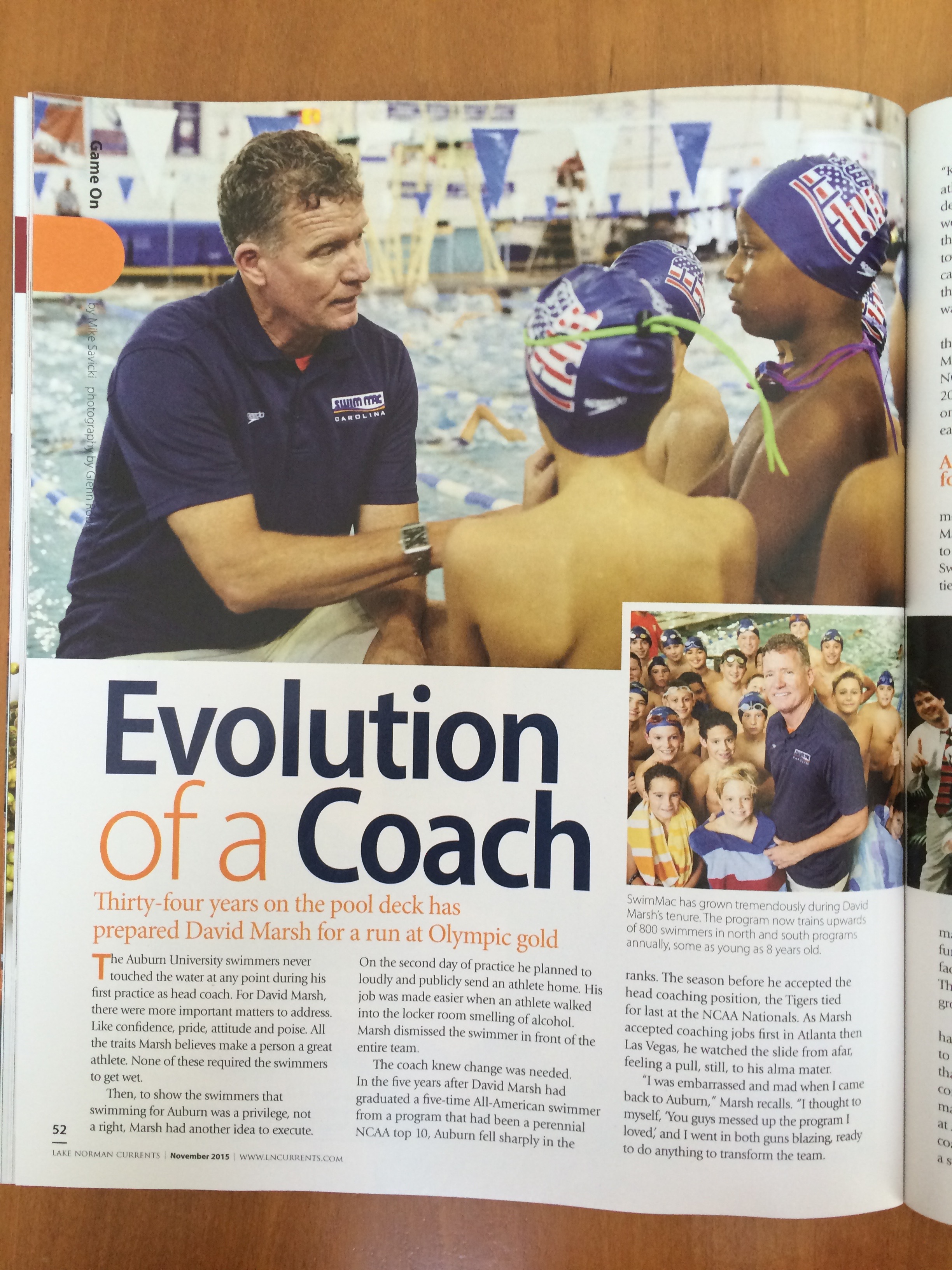Evolution of a Coach
34 years on the pool deck has prepared David Marsh for a run at Olympic gold
By Mike Savicki
The Auburn University swimmers never touched the water at any point during his first practice as head coach. For David Marsh, there were more important matters to address. Like confidence, pride, attitude and poise. All the traits Marsh believes make a person a great athlete. None of these required the swimmers to get wet.
Then, to show the swimmers that swimming for Auburn was a privilege, not a right, Marsh had another idea to execute. On the second day of practice he planned to loudly and publicly send an athlete home. His job was made easier when an athlete walked into the locker room smelling of alcohol. Marsh dismissed the swimmer in front of the entire team.
The coach knew change was needed. In the five years after David Marsh had graduated a five time all-American swimmer from a program that had been a perennial NCAA top ten, Auburn fell sharply in the ranks. The season before he accepted the head coaching position, the Tigers tied for last at the NCAA Nationals. As Marsh accepted coaching jobs first in Atlanta then Las Vegas, he watched the slide from afar, feeling a pull, still, to his alma mater.
“I was embarrassed and mad when I came back to Auburn,” David Marsh recalls. “I thought to myself, ‘you guys messed up the program I loved,’ and I went in both guns blazing, ready to do anything to transform the team.
“And it started with attitude,” he continues. “Knowing confident people make the best athletes, I wanted to change posture and demeanor of the team. The first practice we worked on handshakes, looking someone in the eye, exuding confidence. I had them put towels around their neck, told them it was their capes, and had them walk around the deck like they were Superman. ‘Give me the Superman walk,’ I said, and never forget it.”
His philosophy worked. Four years later, The Tigers won their first conference title under Marsh. Three years later they claimed their first NCAA title. And from the mid 1990’s through 2007, every swimmer walked away with at least one championship ring. Some had one for each of their for years.
A huge step back for an even bigger gain
In 2007, after 17 years and 12 combined men’s and women’s NCAA championships, Marsh made the decision to leave Auburn to become CEO and Director of Coaching at SwimMac Carolina, an established but middle tier community-based program that lacked many of the resources like staff, trainers and funds, not to mention a world class swim facility, that he had enjoyed while at Auburn. The move, he says, was necessary for him to grow as a coach, but it surprised many.
“For a swim coach, the pinnacle of coaching has traditionally been to lead a collegiate team to the top and build a world class program that has the resources to sustain itself and continue to bring in athletes who go on to make their mark,” Marsh says. “ I had all that at Auburn, but felt that to become a better coach, to continue the evolution, I had to take a step back. And by taking a step back, I mean I made a huge one. When I got to Charlotte, I was changing lane lines in a twenty-five yard pool with steamed windows the first day, when I hadn’t done that in years.”
But Marsh has never been one to shy away from a change, and in leaving Auburn he saw not just challenge, but opportunity. Of the hundreds of community-based programs and cities he could have selected, he chose Charlotte, seeing it as a progressive, underachieving southern city that loved sports and was primed to wrap its arms around the concept of swimmers living and training locally, some to represent their country at the Olympics.
And from the beginning, Marsh says, he felt a strong pull to Davidson and Lake Norman. The community feel attracted his wife and family. The collegiate and educational atmosphere also allowed Marsh to envision his swimmers participating as athletes, role models and strong community servants. And in Davidson, he says, he also went from not paying much attention to his spiritual side to becoming a Christian.
SwimMac has grown tremendously during Marsh’s tenure. The program now trains upwards of 800 swimmers in north and south programs annually, some as young as eight years old, and each and every athlete teaches him something new. To date, Marsh has led SwimMAC to three consecutive USA club excellence championships, a first for any program.
Olympic promise
When USA Swimming announced on September 9, 2015, that Marsh would serve as the head coach of the women’s team of the 2016 US Olympic Team, the coach welcomed the announcement much like he did the change of coming to Charlotte. As a self-proclaimed “lifelong learner”, he saw it as an opportunity to create something special.
“If you imagine a blank canvas,” he says, “I have the brush to work the canvas. I bring together everything necessary to create the painting. I don’t even know what the picture will look like, and I’m not the only one doing the painting, but what this means to me is that I am responsible for the process, and for that, I see great promise.”
Wearing the hats of both SwimMac Carolina and USA Olympics, Marsh admits to a new personal challenge. Turning it off and finding balance, he admits, has become a challenge. To help maintain balance, his Wednesday mornings have become his scheduled down time. Marsh generally walks his dog through the Davidson campus and listens to podcasts while trying as much as possible to avoid answering phone calls, texts and emails. His assistant coaches run morning practice and understand his absence. If he didn’t schedule the mornings, he admits, he would likely overload on swimming.
After 34 years on the pool deck, David Marsh is as happy and energized as he was the first day he coached a group of young swimmers. His love of the sport and dedication to the athlete has remained the same, while his philosophy has changed.
He shares, “Now, through the years, as I have become more of an advocate for the swimmer than a dictator over the swimmer, I have learned to embrace this wonderful journey and recognize the transformations happening around me. I want to see swimmers grow as human beings in the sport and reach the level they want. And my job as a coach, I’ll be there to nudge them, as I always have, to be just that much better.”
This article was originally published in Currents Magazine.

